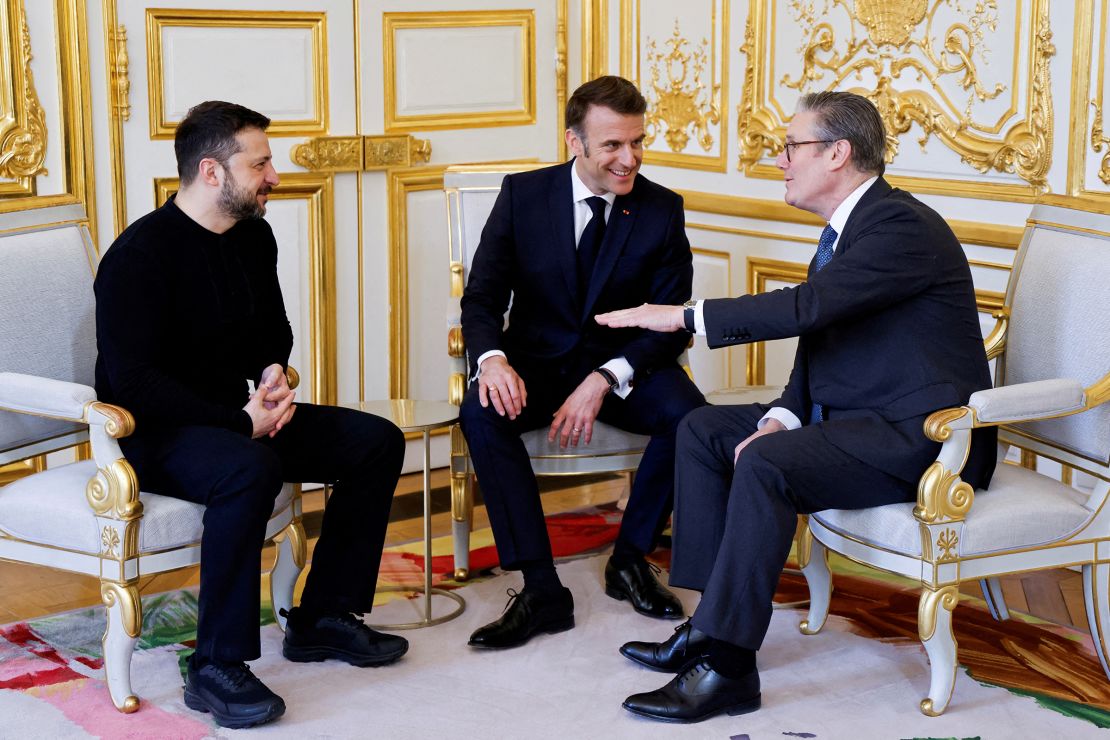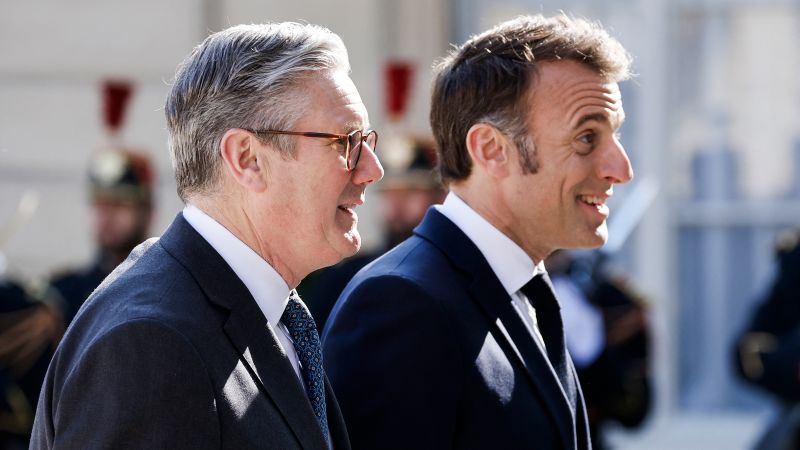CNN
—
Ukraine’s European allies say now is not the time for lifting sanctions on Russia, after Moscow said it would only agree to a US-brokered deal on ending fighting in the Black Sea if some sanctions were eased.
The leaders of the United Kingdom, France and Germany all affirmed at a summit on Thursday that Europe will not lift sanctions on Russia – a strong and seemingly coordinated message to the Trump administration, which has said it is still evaluating the Kremlin’s demands.
They spoke after a meeting of the so-called “coalition of the willing” in Paris which discussed how to bolster support for Kyiv and what role they might play if a peace deal is struck with Russia.
While divisions remain among the leaders about how to respond, they spoke in unison on Russia’s demand to ease sanctions.
“(There is) complete clarity that now is not the time for lifting of sanctions,” British Prime Minister Keir Starmer said.
“Quite the contrary – what we discussed is how we can increase sanctions to support the US initiative, to bring Russia to the table through further pressure from this group of countries,” the British Prime Minister said, still striking a conciliatory tone toward the United States.
Starmer said the meeting involved more than 30 countries, including Ukraine’s European allies and NATO officials. He described the meeting as “very constructive.”
Echoing Starmer, German Chancellor Olaf Scholz said stopping sanctions would be a “serious mistake.”
“It makes no sense to end the sanctions until peace has actually been achieved, and unfortunately we are still a long way from that, as you can see.”
This week the US announced that Russia and Ukraine had agreed to end fighting in the Black Sea. But Moscow soon followed up the statement by saying it would only implement the deal once some of the sanctions imposed on Russian banks and exports over its invasion of Ukraine are lifted.
US Secretary of State Marco Rubio said Wednesday that the United States is “going to evaluate” Russia’s conditions to agreeing to a Black Sea partial ceasefire.
When the US negotiators return from Saudi Arabia, Rubio said, they will be “sitting down, going through the proposals, getting their impressions of the conversations, so we can more fully understand what the Russian position is, or what their ask is in exchange.”

“There was absolute clarity that Russia is trying to delay, is playing games. And we have to be absolutely clear about that,” Starmer added.
Ukrainian President Volodymyr Zelensky also called for “more pressure” and “more packages of sanctions” on Russia.
“All 31 votes today supported that there will be no lifting of any sanctions against Russia until this war ends in a just peace,” Zelensky said in a press conference from Paris.
Zelensky also called for unity amid Russian President Vladimir Putin’s desire to “divide Europe and America.”
“We want America to be stronger. I agree with Emmanuel (Macron) that we all need it. It’s not even a matter of desire, but we need America to be stronger in relation to Russia,” the Ukrainian president said.
“Putin wants to negotiate over territory from a stronger position. He’s thinking only about war,” Zelensky said earlier in a social media post.
“They’re dragging-out the talks and trying to get the US stuck in endless, pointless discussions about fake ‘conditions’ just to buy time and then try to grab more land,” Zelensky added, highlighting that Ukrainian intelligence indicates Russian forces are getting ready for new offensives against the Sumy, Kharkiv and Zaporizhzhia regions of Ukraine.
France also shed more light on a proposal to send forces drawn from European armies to Ukraine in the event that a ceasefire is reached.
France and the United Kingdom previously floated the idea of sending peacekeepers to Ukraine and said they would be willing to put boots on the ground. But their latest discussions have honed in on an alternate term: “reassurance forces.”
“These would be forces from a number of states … present in strategic locations pre-identified with the Ukrainians which would provide long-term support, reassurance for the armies and act as a deterrent to potential Russian aggression,” Macron said Thursday, adding that the forces would never serve as a “substitution for the Ukrainian army.”
Regarding support for the “reassurance forces,” Macron said: “It was not unanimous today, as we all know, and we don’t need unanimity.”
Italian Prime Minister Giorgia Meloni said allies discussed the possibility of the United Nations playing a part in enforcing a ceasefire, but underlined that Italian forces would not participate in a possible military force deployed in Ukraine.
“During the meeting, the leaders also discussed the importance of effective implementation and monitoring of the ceasefire, on which a possible role for the United Nations is emerging, in line with the position of the Italian government,” Italy’s readout of the summit said.
Meloni, one of Trump’s closest allies in Europe, also expressed hopes that the United States would participate in the next meeting of the coalition.
The United States is not currently a member of the ‘Coalition of the Willing’ with Macron acknowledging that although he “hopes” the US would support a European deployment to Ukraine, Europe needs to “prepare for a situation where they (the US) will not commit” to Ukraine’s security.
Russia has repeatedly said it would consider any foreign military presence in Ukraine “unacceptable.”
The French president also announced plans for a French-British team to be sent to Ukraine to help Kyiv “prepare the format of tomorrow’s Ukrainian army.”
CNN’s Jennifer Hansler contributed to this report.

